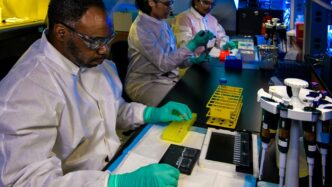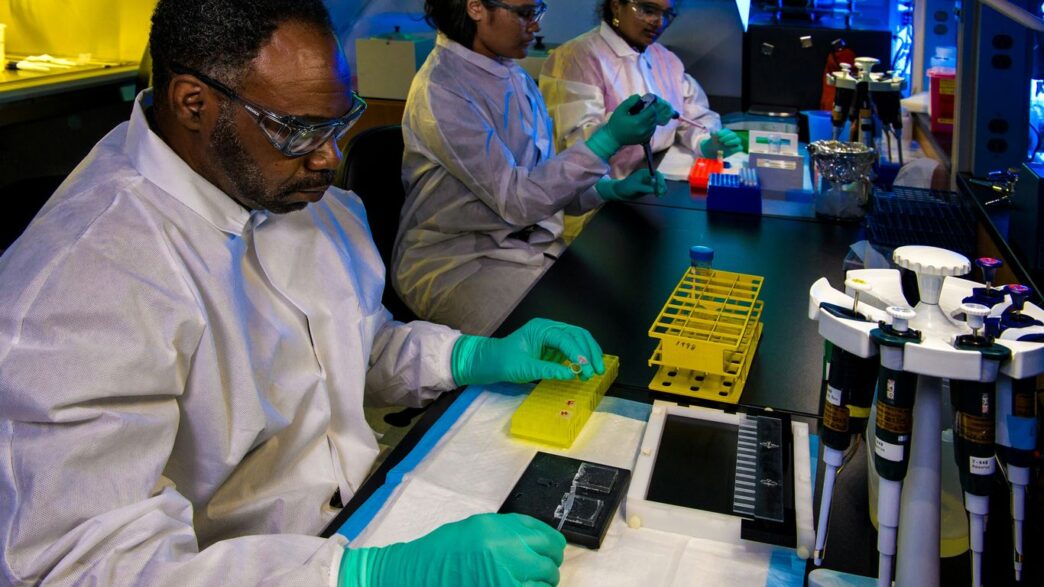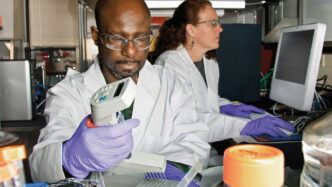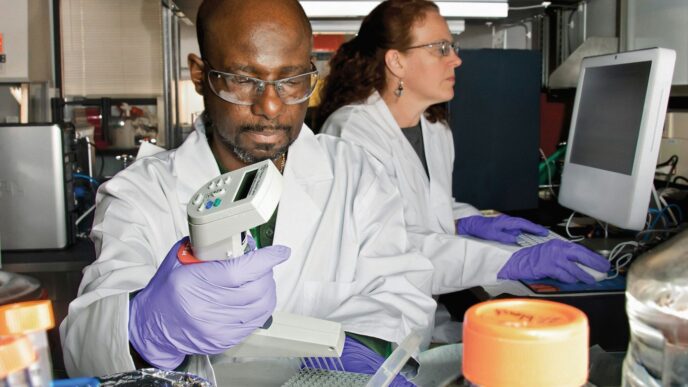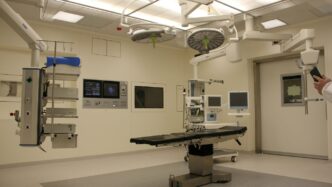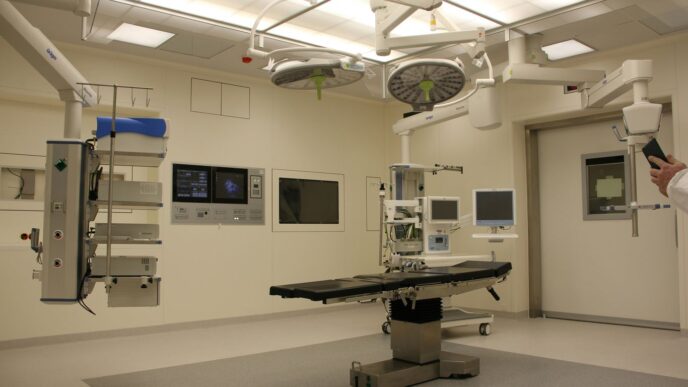Baltimore is really becoming a big name in biotech. Lots of companies here are working on new ways to help people with their health. From finding diseases early to creating new medicines, these Baltimore biotech companies are making a real difference. It’s pretty cool to see so much innovation happening right here.
Key Takeaways
- Several Baltimore biotech companies are developing treatments for tough diseases like Alzheimer’s and cancer.
- New diagnostic tools are being created to catch diseases earlier using simple tests.
- AI is playing a growing role in speeding up medical research and development.
- Companies are focusing on making medicines more affordable, like biosimilars.
- Support services are available to help biotech firms with rules and getting their products out.
Pioneering Therapies from Baltimore Biotech Companies
Baltimore’s biotech scene is really buzzing with activity, and a few companies are making some serious waves with new ways to tackle tough diseases. It’s not just about incremental changes; these folks are aiming for big leaps forward.
AgeneBio’s Focus on Neurological Disorders
AgeneBio is zeroing in on brain health, specifically looking at conditions like Alzheimer’s disease and milder forms of cognitive decline. Their main project, AGB101, is designed to calm down overactivity in a part of the brain called the hippocampus. This area is super important for memory, and when it gets too worked up, it can speed up memory loss, especially as we get older or with certain brain conditions. The idea here is to potentially slow down the start of Alzheimer’s symptoms, giving people more time with their memories intact. It’s a pretty hopeful approach for a disease that’s affected so many families.
AsclepiX Therapeutics’ Peptide-Based Drug Development
AsclepiX Therapeutics is exploring a different path, focusing on peptide-based drugs. Peptides are like smaller, simpler versions of proteins, and they can be designed to interact with specific targets in the body. AsclepiX is working on using these to treat diseases, and they’ve mentioned conditions like diabetes. The goal is to create treatments that are more precise, hitting the problem areas without causing as many side effects. It’s a smart way to build medicines from the ground up.
Immunomic Therapeutics’ Nucleic Acid Vaccine Platform
Then there’s Immunomic Therapeutics, which is building a whole new way to make vaccines using something called nucleic acids. Think of it as using the body’s own genetic instructions to teach the immune system how to fight off diseases. Their UNITE platform is pretty flexible and they’re looking at using it for all sorts of things – from allergies and cancer to even infectious diseases. The potential here is to create treatments that are highly specific and can train the immune system to recognize and attack threats more effectively. It’s a cutting-edge area that could change how we approach a lot of different health problems.
Advancing Cancer Treatment Through Local Innovation
Baltimore’s biotech scene is really making waves when it comes to fighting cancer. It’s not just about one big breakthrough; it’s a lot of different companies tackling the problem from various angles.
Vaccinogen’s Personalized Cancer Vaccine
Vaccinogen is working on something called OncoVAX. Basically, it’s a vaccine made from a patient’s own tumor cells. The idea is to train the patient’s immune system to recognize and attack any remaining cancer cells after surgery, aiming to stop the cancer from coming back. It’s a very personal approach to cancer treatment.
aSKY Therapeutics’ Novel Oncology Therapeutic
While specific details about aSKY Therapeutics’ oncology work aren’t readily available in the provided text, many companies in this space are exploring new ways to target cancer cells directly or to boost the body’s own defenses. This often involves looking at specific genetic mutations within tumors or finding ways to make the immune system more effective against cancer.
Previse’s Early Cancer Detection
Previse, formerly known as Capsulomics, is focused on catching cancer much earlier. Their main test, Esopredict, looks at patients with a condition called Barrett’s esophagus, which can sometimes lead to esophageal cancer. By checking for certain markers in the DNA, Previse can help doctors figure out who is most at risk. This means people who need closer monitoring or earlier treatment can get it, while those at lower risk might avoid unnecessary procedures. They’re hoping to expand this idea to find other cancers early, too.
Revolutionizing Diagnostics with Baltimore Expertise
Baltimore’s biotech scene isn’t just about creating new treatments; it’s also about finding smarter, faster ways to figure out what’s going on inside us. Companies here are really pushing the envelope when it comes to diagnostics, making it easier to catch diseases early and understand them better.
Delfi Diagnostics’ Liquid Biopsy Technology
Think about getting a blood test that could tell you if you have cancer, even before you have any symptoms. That’s what Delfi Diagnostics is working on. They’re developing a liquid biopsy technology that looks for tiny fragments of DNA shed by tumors into the bloodstream. This approach could change the game for early cancer detection, potentially saving countless lives by catching the disease at its most treatable stages. It’s a less invasive way to screen for cancer, and the hope is that it will become a routine part of healthcare.
Novel Microdevices’ Point-of-Care Diagnostics
Another area where Baltimore is making waves is in point-of-care diagnostics. Novel Microdevices is focused on creating small, easy-to-use devices that can perform diagnostic tests right where the patient is – like in a doctor’s office or even at home. This means faster results and quicker decisions about treatment. Imagine needing a test and getting the answer in minutes, not days. That’s the kind of efficiency they’re aiming for, which could really speed up the diagnostic process and improve patient care.
The Role of AI in Baltimore’s Life Sciences Sector
Artificial intelligence is really changing how we do things in medicine and research, and Baltimore is right in the middle of it. Think about it – we’re talking about using smart computer programs to sift through massive amounts of health data, find patterns we might miss, and even predict how diseases might progress. It’s a big deal for figuring out new treatments and understanding illnesses better.
Synthego’s AI-Optimized Genome Engineering
Synthego is a company that’s making waves with its work in gene editing, specifically using CRISPR technology. CRISPR is like a super precise molecular scissors that lets scientists edit DNA. Synthego uses AI to help design the guide molecules, called gRNA, that tell the CRISPR system exactly where to make a cut in the DNA. By using AI, they can create better, more accurate gRNAs, which speeds up the whole gene editing process and leads to more reliable results. This is pretty important for developing new genetic therapies.
AI-Driven Insights for Research Acceleration
Beyond specific companies, AI is broadly helping speed up research across Baltimore’s life sciences scene. It’s not just about drug discovery, either. AI is being used to:
- Analyze complex biological data from experiments.
- Identify potential drug targets more quickly.
- Help design clinical trials more effectively.
- Improve the accuracy of medical diagnoses.
Companies are using AI to make sense of all the information generated in labs, which can be overwhelming. This helps researchers focus on the actual science instead of getting bogged down in data management. It’s a way to get new medical ideas from the lab bench to patients faster.
Supporting Growth and Compliance in Biotech

Baltimore’s biotech scene is buzzing, but getting a groundbreaking idea from the lab bench to the patient isn’t always straightforward. That’s where companies specializing in support services come in, helping innovators navigate the complex paths of growth and regulatory adherence.
Amethyst Technologies’ Regulatory Support
Think of Amethyst Technologies as your guide through the maze of regulations. They help biotech firms, especially those dealing with pharmaceuticals and medical devices, meet the strict standards set by bodies like the FDA. This isn’t just about paperwork; it’s about making sure products are safe and work as intended. Their work in validation and quality assurance is pretty important for companies trying to get new treatments approved and manufactured properly.
Scispot’s Digital Infrastructure for Research
For any biotech company to really grow, it needs a solid digital backbone. Scispot provides a toolkit designed for the unique needs of tech and biotech. Their platform helps organize research data, manage workflows, and keep everything compliant. Whether you’re deep into genomics or developing new therapies, Scispot’s system aims to make data management smoother and collaboration easier. They even have features to help track compliance for companies working in areas regulated by the FDA, which can be a real headache otherwise. Basically, they help labs run more efficiently so scientists can focus on the science.
Adjuvant Partners’ Product Commercialization Guidance
Once a therapy shows promise, the next big hurdle is bringing it to market. Adjuvant Partners steps in here, offering advice on everything from clinical trials to getting the necessary approvals and developing business strategies. They help companies figure out the best way to get their innovations into the hands of the people who need them, making the whole process of commercialization less daunting.
Biosimilars and Affordable Medicine Initiatives
Making important medicines more accessible is a big deal in healthcare today. That’s where companies working on biosimilars come in. Biosimilars are like close copies of existing biologic drugs, but they’re made by different companies. The goal is to offer similar treatments at a lower cost, which can really help patients who need these therapies but might struggle with the price of the original brand.
BioFactura’s Commitment to Accessible Biologics
BioFactura is one of the companies in Baltimore focused on this area. They’re developing and manufacturing biosimilars for a couple of key treatment categories: autoimmune diseases and cancer. Think about conditions like rheumatoid arthritis or certain types of cancer where biologic drugs have been game-changers. BioFactura’s work means that more people might be able to get these kinds of treatments without the high price tag. It’s about expanding access to medicines that can make a real difference in people’s lives. They’re not just making copies; they’re working to ensure these biosimilars meet strict quality standards, so patients and doctors can trust them just as much as the original.
Baltimore’s Biotech Scene: Looking Ahead
So, what does all this mean for Baltimore? It really shows that this city is becoming a major player in the world of biotech. We’ve seen companies working on everything from new cancer treatments to better ways to spot diseases early. It’s not just about the science, though. There’s a real sense of community here, with universities, startups, and investors all working together. This kind of collaboration is what helps new ideas actually make it out of the lab and into the hands of people who need them. Baltimore’s biotech scene is definitely one to watch as it continues to grow and change how we think about medicine.
Frequently Asked Questions
What kind of medical problems are Baltimore biotech companies trying to solve?
Baltimore’s biotech companies are working on many different health issues. Some are creating new medicines for brain problems like Alzheimer’s disease. Others are developing ways to fight cancer, like special vaccines or tests that find cancer early. They are also making better tools to find out what’s wrong with people quickly and easily, sometimes just with a blood test.
How are these companies using new technology like AI?
Artificial intelligence, or AI, is a big help for these companies. They use it to speed up how they find new drugs and understand diseases better. AI can help design special tools for changing genes, making the process more accurate and faster. It’s like having a super-smart assistant for scientific research.
What are biosimilars and why are they important?
Biosimilars are like copies of expensive biologic medicines that are already approved. They are made to work the same way but cost less. Companies like BioFactura are making these to help more people afford important treatments for things like cancer and diseases where the body attacks itself.
How do these companies help get new medicines approved and to patients?
Getting a new medicine from the lab to the pharmacy is a long process. Companies like Amethyst Technologies help other biotech firms follow the strict rules set by government agencies like the FDA. Others, like Adjuvant Partners, help with testing the medicines and figuring out how to sell them, making sure they reach the people who need them safely.
What makes Baltimore a good place for biotech companies?
Baltimore is a great spot for these companies because it has strong universities with smart researchers. It also has a growing network of new companies and support systems that help them work together and get funding. This creates a lively environment where new ideas can grow and turn into real medical solutions.
Are there companies focused on making medical tests easier to use?
Yes, some companies are making medical tests that are faster and can be used right where the patient is, like in a doctor’s office or even at home. These ‘point-of-care’ tests can quickly find infections or other health problems, which helps doctors make decisions faster and get patients the right treatment sooner.

